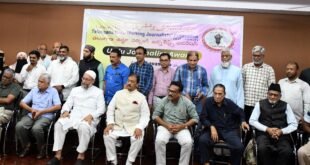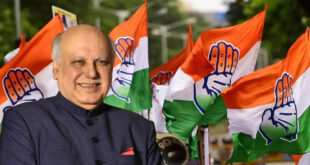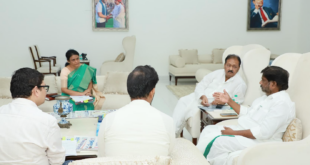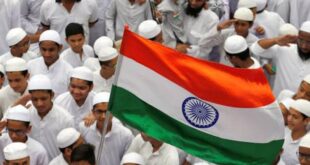By: Asad Mirza
Three events of the last week, related to jurists and the courts have restored one’s belief in the institutions and actors, who are supposed to be the guardian angels of the Indian Democracy, besides the supremacy of the rule of law and the constitution.
In a notable judgment, the Aurangabad bench of the Bombay High Court has observed that persons holding peaceful protests against a particular law cannot be termed as traitors or anti-nationals.
The court’s observation on peaceful protesters comes at a time when many senior BJP leaders and even ministers, have termed these demonstrators as traitors. In the run up to the recent Delhi assembly elections, the BJP focused its attention in particular on the women protest at Shaheen Bagh, with its communal rhetoric criticised by many.
The bench noted that the orders passed by the local magistrate and police were only because the petitioner and his companions wanted to agitate against CAA. It said the orders passed by the magistrate and the police were illegal and needed to be quashed and set aside. It noted that it is the duty of the government to approach such persons, have talks with them and try to convince them.
The bench in its order observed that “We must keep in mind we are a democratic republic and our Constitution has given us rule of law and not rule of majority. When such act (CAA) is made, some people, may be of a particular religion, like Muslims may feel that it is against their interest and such act needs to be opposed.”
In its observations the court also referred to the Indian freedom struggle and the Khilafat Movement, observing that the Khilafat movement was in solidarity with and support to the cause of Muslims of another country, even though no Indian Muslims were affected in seeking to preserve the authority of the Ottoman Sultan. But still the Congress party gave wholehearted support to this agitation of the Muslim citizens of India, as the theme was woven into the overall action against the British.
Praising the non-violent nature of the agitations across the country, the bench said, “India got freedom due to agitations which were non- violent and this path of non-violence is followed by the people of this country till date. We are fortunate that most people of this country still believe in non-violence.”
Commenting further it said that it is unfortunate but the people are required to agitate against their own government now, but only on that ground the agitation cannot be suppressed.
The court also praised the fact that people from all religions have joined the protest against the CAA, saying the support received by the ‘minority community’ shows that ‘we have achieved fraternity to a great extent’.
The court also observed that there is a need for the bureaucracy to be ‘sensitive’ in matters of dissent and that it needs to receive proper training on human rights.
In the second event, Supreme Court judge, Justice DY Chandrachud delivering 15th Justice PD Desai Memorial Lecture organised in Ahmedabad on the occasion of the World Human Rights Day, called dissent a ‘safety valve’ of democracy, adding that ‘blanket labelling’ of dissent as anti-national or anti-democratic strikes at the ‘heart’ of the country’s commitment to protect constitutional values and promote deliberative democracy. And use of state machinery to curb dissent instils fear, which violates the rule of law.
Justice Chandrachud felt that protecting dissent is but a reminder that while a democratic elected government offers us a legitimate tool for development and social coordination, they can never claim a monopoly over the values and identities that define our plural society. According to him, the ‘great threat to pluralism’ is the suppression of differences and silencing of popular and unpopular voices offering alternative or opposing views.
He was of the view that the country was conceptualised ‘as incorporating its vast diversity and not eliminating it’. He said the country’s pluralism underlines a commitment to protect, “the very idea of India as a refuge to people of various states, races, languages and beliefs, the framers of the Constitution rejected the notion of a Hindu India and a Muslim India. They recognised only the Republic of India.” Pluralism has already achieved its greatest triumph — the existence of India. The nation’s continued survival shows us that our desire for a shared pursuit of happiness outweighs the difference in the colour of our skin, the languages we speak, or the name we give the almighty, he added.
In the third event, the Karnataka High Court has directed the state government to file a report on whether children at a private school in Bidar district were interrogated by policemen in uniform as part of the investigation into a sedition case registered against the school and its authorities over a play staged to oppose the CAA. As the police’s action violates the child law along side the human rights laws.
Noted SC lawyer Gautam Bhatia, has commented that the Constitution is not merely a legal document but a charter of values and principles; a vision of a free, just, and equal society. And it is a vision that is not static in time, but subject to constant renewal as each generation discovers anew, through discussion and debate, the founding principles of our Republic.
One common factor, which could be noted in these separate incidents, is the use of the words and sentiments, which have been used by the honourable jurists. They are the same words, which have been used by the protestors and their supporters at public rallies and in their campaign on the social media. This in reality means that the protestors nowhere in the country were acting unconstitutionally or illegally, what they were trying to achieve was raise the issue for the common benefit of all Indians and get the government responsive to their demands. What they have achieved is that they have made words like, ‘democracy, justice, pluralism, constitutionalism, azaadi, mera bharat mahan, dissent, justice, equality’ part of the common usage, now even the tiny tots across the country have become familiar with these terms and can be seen raising them on the streets, a vision for the true India of the future.
It is this idea of the Indian Constitution that has come to the vanguard during the recent protests against the CAA+NRC+NPR trio. These protests have been sounded in a diversity of registers: but an important tone has been that of the Constitution. It is in this awareness that the Constitution belongs to everyone that the on going protests can be best understood as acts of reclaiming it.
While different institutions can take different views about what the Constitution says, no one institution can exercise a monopoly over constitutional truth or wisdom. And this is why it is so vital for constitutionalism to exist, live, and thrive, outside the domain of institutions. The CAA protests have shown us what a dynamic and evolving conversation about the Constitution, and about constitutional values, can look like. It is for us, now, to take this conversation to the next milestone.

Asad Mirza is a Sr journalist based in New Delhi.
In his career spanning more than 20 years, he was also associated with BBC Urdu Service and Khaleej Times of Dubai.
He writes on Muslims, educational and international affairs issues.
Email: asad.mirza.nd@gmail.com
 Gawah (The Witness) – Hyderabad India Fearless By Birth, Pristine by Choice – First National Urdu Weekly From South India – Latest News, Breaking News, Special Stories, Interviews, Islamic, World, India, National News
Gawah (The Witness) – Hyderabad India Fearless By Birth, Pristine by Choice – First National Urdu Weekly From South India – Latest News, Breaking News, Special Stories, Interviews, Islamic, World, India, National News





